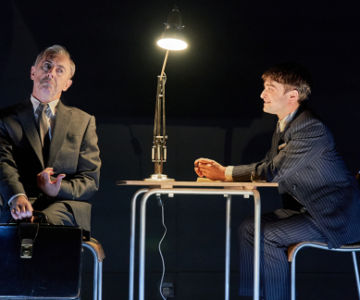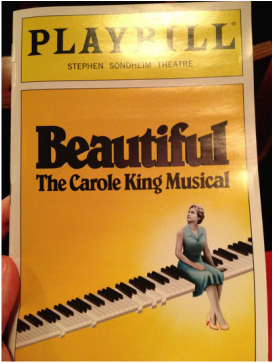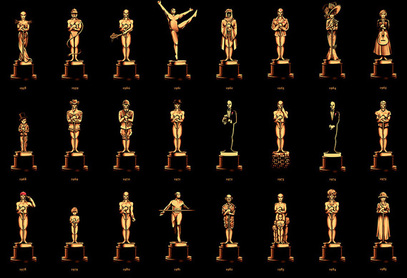 Purfit Protein Powder Review, Plus My Favorite Green Smoothie Recipe!by Randi / February 10, 2014
Purfit Protein Powder Review, Plus My Favorite Green Smoothie Recipe!by Randi / February 10, 2014 The supremely entertaining new musical “A Gentleman’s Guide to Love & Murder” is one of the most exciting new shows this Broadway season. Halting the omnipresent influx of jukebox musicals and, more importantly, making murder hilarious, “Gentleman’s Guide” will likely be a main player at the Tony Awards this June. Despite its somewhat unseemly subject matter, it is an old-fashioned and very British show.
The dark comedy concerns a young man named Monty Navarro, who is finally told of his birthright: that he is related to the wealthy D’Ysquith clan, and ninth in line to inherit its dukedom. (The name is pronounced like ‘dies quick’. So funny.) Monty, who seems like a well-mannered, kindhearted gentleman, begins a journey to become part of the family that quickly morphs into a killing spree.
The dark comedy concerns a young man named Monty Navarro, who is finally told of his birthright: that he is related to the wealthy D’Ysquith clan, and ninth in line to inherit its dukedom. (The name is pronounced like ‘dies quick’. So funny.) Monty, who seems like a well-mannered, kindhearted gentleman, begins a journey to become part of the family that quickly morphs into a killing spree.
Monty initially reaches out to the D’Ysquiths to bond in normal ways, but the posh elitists rebuff him. After such terrible treatment, Monty sets out to methodically, and humorously, murder each of the 8 relatives ahead of him in succession.
This surprising turn of events works because Monty is so charming, and the actor playing him, Bryce Pinkham, manipulates the pacing so well. But the real star of the show, and its biggest selling point, and the main reason to see it, is Jefferson Mays. The well respected Tony-winning actor (for 2003’s “I Am My Own Wife”) plays all eight of the doomed D’Ysquith family members, men and women, young and old. He quickly switches from the old priest (whose death showcases my favorite ridiculous staging) to young bicurious student to middle-aged actress, and he sells each character just as eight individual actors could. As each death occurs, one gets nervous that soon Mays won’t be onstage anymore. That would be a shame. (Luckily, a clever end twist and a sort of cliffhanger ending make sure that this doesn’t happen.)
Mays is truly spectacular, particularly as the young, too trusting, slightly doofy Oxbridge student who takes a fast and overzealous liking to Monty. Sadly, Henry D’Ysquith has a weakness too obvious and too delicious for Monty to ignore: his penchant for beekeeping. It is probably also obvious that his death is one of the funniest.
The lovably silly character of Henry gives Mays and Pinkham their most enjoyable song and what I thought was the highlight of the show. The song “Better With A Man” has Monty being a little overly friendly to the very obviously receptive Henry. While they sing ostensibly about friendship, the choreography clearly says otherwise, and the number verges into pure slapstick. It’s so wrong, and so funny.
The other highlight musically is a pas de trois between Monty, his married lover Sibella, and his new cousin Phoebe, whom he plans to marry. As is customary in love triangles performed on stage, the scene finds Monty trying to hide both women from each other when they both visit his home. Impressive on all counts, the scene showcases the voices of the women and the timing of Pinkham better than any other.
However, aside from these two songs, the music is disappointing. What makes it seem very old-fashioned in the best ways also accounts for its old-fashioned sense musically. Most of the music is not the kind you’d want to listen to outside the Walter Kerr theatre. There are the boring choral bits, where the ensemble sings the same uninspired lines over and over. There are solos that don’t go anywhere and feel as if written as monologues and not as sung pieces. The music often does drive the show’s plot forward, as it should, but it doesn’t do it any better than the words unsung would, which defeats the purpose of making a show into a musical. It’s the kind of show where I would love to see it again, but no way would I ever listen to the cast recording.
Despite the majority of the music being disappointing, the show itself is gold. You feel terrible for laughing and for secretly rooting for Monty, because he doesn’t seem like a bad guy (despite everything to the contrary). I love that the show boasts so much new talent, and that it’s not like anything else recently on Broadway. If you have the chance to see it, you won’t regret it. I’m sure Mays will be a strong contender come Tony night, but all I hope is that the show’s Tony performance is “Better With A Man” (cross your fingers!).
This surprising turn of events works because Monty is so charming, and the actor playing him, Bryce Pinkham, manipulates the pacing so well. But the real star of the show, and its biggest selling point, and the main reason to see it, is Jefferson Mays. The well respected Tony-winning actor (for 2003’s “I Am My Own Wife”) plays all eight of the doomed D’Ysquith family members, men and women, young and old. He quickly switches from the old priest (whose death showcases my favorite ridiculous staging) to young bicurious student to middle-aged actress, and he sells each character just as eight individual actors could. As each death occurs, one gets nervous that soon Mays won’t be onstage anymore. That would be a shame. (Luckily, a clever end twist and a sort of cliffhanger ending make sure that this doesn’t happen.)
Mays is truly spectacular, particularly as the young, too trusting, slightly doofy Oxbridge student who takes a fast and overzealous liking to Monty. Sadly, Henry D’Ysquith has a weakness too obvious and too delicious for Monty to ignore: his penchant for beekeeping. It is probably also obvious that his death is one of the funniest.
The lovably silly character of Henry gives Mays and Pinkham their most enjoyable song and what I thought was the highlight of the show. The song “Better With A Man” has Monty being a little overly friendly to the very obviously receptive Henry. While they sing ostensibly about friendship, the choreography clearly says otherwise, and the number verges into pure slapstick. It’s so wrong, and so funny.
The other highlight musically is a pas de trois between Monty, his married lover Sibella, and his new cousin Phoebe, whom he plans to marry. As is customary in love triangles performed on stage, the scene finds Monty trying to hide both women from each other when they both visit his home. Impressive on all counts, the scene showcases the voices of the women and the timing of Pinkham better than any other.
However, aside from these two songs, the music is disappointing. What makes it seem very old-fashioned in the best ways also accounts for its old-fashioned sense musically. Most of the music is not the kind you’d want to listen to outside the Walter Kerr theatre. There are the boring choral bits, where the ensemble sings the same uninspired lines over and over. There are solos that don’t go anywhere and feel as if written as monologues and not as sung pieces. The music often does drive the show’s plot forward, as it should, but it doesn’t do it any better than the words unsung would, which defeats the purpose of making a show into a musical. It’s the kind of show where I would love to see it again, but no way would I ever listen to the cast recording.
Despite the majority of the music being disappointing, the show itself is gold. You feel terrible for laughing and for secretly rooting for Monty, because he doesn’t seem like a bad guy (despite everything to the contrary). I love that the show boasts so much new talent, and that it’s not like anything else recently on Broadway. If you have the chance to see it, you won’t regret it. I’m sure Mays will be a strong contender come Tony night, but all I hope is that the show’s Tony performance is “Better With A Man” (cross your fingers!).







